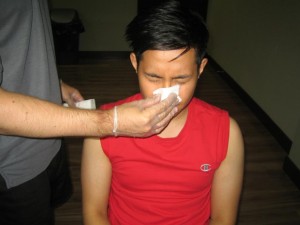Nosebleeds are due to different causes such as accidents in sports, assault, picking of the nose, and some medical ailments such as elevated blood pressure, atherosclerosis, as well as intake of medications like aspirin and anticoagulants. Some medicines that reduce inflammation can also cause nose bleeding. The most common causes of nose bleeding are allergies, dry air, colds, a deviated septum, and sinus infections. There are two types of nose bleeds – anterior and posterior nosebleeds.
[youtube url=”https://www.youtube.com/watch?v=vRO0qNI-Cnk” width=”220″]- Anterior nosebleeds – the bleeding stops quickly and can easily be controlled.
- Posterior nosebleeds – the artery at the back of the nose begins to bleed. This type of nose bleeding is difficult to stop and requires emergency care. This happens mostly in older people.
There are several ways of preventing nosebleeds

- Drinking plenty of water in order to keep the mucous membranes in the nose moist. Spray with saline the inner lining of the nasal passages.
- The most effective way in stopping nosebleeds is pinching the nostrils together for 15 seconds, or until the nose stops bleeding. When the nose stops bleeding, avoid blowing the nose or doing anything that might cause another nosebleed.
- A recurring nosebleed is a sign of a more serious problem. A nosebleed that fails to stop despite the methods used would require immediate medical attention and care.
- Another way of preventing nosebleed is to provide the individual orange juice to drink, but it cannot stop a nosebleed once it has already started, but the citrus bioflavonoids and collagen building vitamin C helps to prevent future nosebleeds.
- Eat fruits rich in vitamin C like strawberries, kiwi and red bell pepper.
First aid treatment for nosebleed
- Let the person sit up straight and tip the head slightly forward. Do not tilt the head back, it can cause blood to run down at the back of the throat and can end up being swallowed. Swallowing blood can irritate the stomach and may cause vomiting. Just spit out any blood that is inside your mouth.
- Using the thumb and forefinger to pinch the soft part of the nose shut. The nose consists of a hard bony part, and the softer part is made of cartilage, and a nosebleed happens in the soft part of the nose.
- Before applying pressure, spray the nose with a medical nasal spray to help stop bleeding.
- Apply an ice pack to the nose and cheeks to constrict the blood vessels and also to stop the bleeding. The person has to breathe through the mouth.
- Keep pinching the nose for 10 minutes or more until the nose stops bleeding. Most nosebleeds will stop after 10 to 20 minutes of direct pressure.
- Apply a moisturizing ointment like the Vaseline or an antiseptic nasal cream inside the nose. Do not blow the nose or putting anything inside the nose for 12 hours after the bleeding has stopped.
- Instruct the individual to rest for a few hours.
